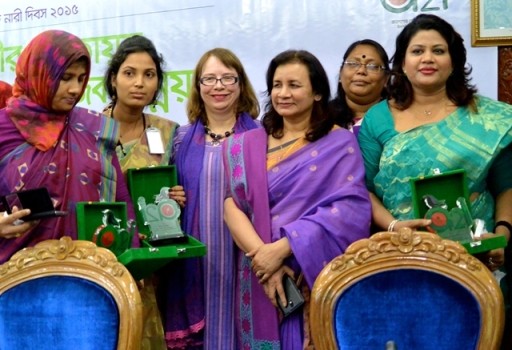
Assalamu aleikum, nomoshkar and good afternoon.
On behalf of USAID, I am delighted to be here today to celebrate International Women’s Day and to honor the accomplishments of women throughout the world, but most particularly in Bangladesh.
Over the past four decades, Bangladeshi women have made enormous strides. They have achieved political empowerment, better job prospects, and improved education. Women have been the engine behind the amazing growth of the ready-made garment industry, which is now number 2 in the world – second only to China. Women now constitute approximately 80 percent of the workforce in this hugely important industry.
In recent years, Bangladesh has also adopted laws to prevent domestic violence and protect domestic violence survivors. And through the leadership of the Ministry of Women’s and Children’s Affairs, Bangladesh is now pursuing an official National Action Plan to Prevent Violence against Women and Children. All of these are major achievements and I could cite a number of others.
Last summer at the Girls Summit, which took place in London, the Honorable Prime Minister made some important commitments, particularly commitments to end child marriage in Bangladesh. The government, quite admirably, has undertaken to revise, modernize and strengthen the existing law – a law that dates back to 1929 – relating to the prevention of child marriage. We hope that a new, stronger and more modern law on child marriage prevention will be passed.
We are very pleased that the government has reemphasized its commitment to the age of 18 as the legal minimum age of marriage for girls. At the same time, we are quite concerned to see press reports over the weekend suggesting that the government is thinking of including counterproductive language allowing early marriage with parental consent. We were really quite surprised at these reports and hope there was some misunderstanding in this regard. A provision allowing 16 and 17 year old children to marry with parental consent would seriously undermine the new law’s intended goal – the goal of putting an end to the harmful practice of child marriage once and for all.
The terribly destructive impact of child marriage on the physical and mental health of girls, on girls’ education and economic opportunities, and on the health and welfare of their children are all being increasingly recognized, as is the strong, ugly link between child marriage and gender-based violence. This growing awareness is thanks in part to the work of people like the female leaders we are honoring today, as well as many others in the room.
One of the most important points to reflect upon and re-emphasize each and every International Women’s Day is that women’s rights are human rights. And the welfare of women is inextricably linked to the welfare of the society and of the nation as a whole. Anyone who is serious about wanting Bangladesh to progress has to be serious about ensuring that women progress.
The Government of Bangladesh has enunciated the goal – the very ambitious but achievable goal – of reaching middle income status by 2021. To accomplish this, women and girls have to have equal access to what we call the “tools of opportunity.”
If women and girls have equal opportunity to attend school and complete their education; and if they have equal access to technology, information, and job opportunities, they will make a difference not only in their own lives but also in the lives of their families, their communities, and their nation.
Equal opportunities for education and jobs for all Bangladeshi women, as well as men, are very important for Bangladesh. Bangladesh cannot expect to achieve its full potential until all of its citizens – the women as well as the men – are achieving their full potential. It cannot expect to reach middle income status if fully half of its citizens – the female half – are left behind.
This is one of the reasons why USAID has been a proud supporter of the A2i initiative. A2i provides the opportunity for women throughout the country to access digital technology at information centers, which are now in operation in all of Bangladesh's union parishads. A2i is enabling women and girls, as well as men and boys, to access a variety of information and services including computer classes, electronic banking services, and job applications at a location near their homes. What’s more, many women are playing a vital role at these centers and helping each other tap into these valuable resources.
Several of these women, I believe, are here with us today along with other inspirational female leaders from government, schools, and private businesses. I applaud each and every one of you, both for your own success, and for you tireless dedication to helping other Bangladeshi women succeed. Thank you for being role models and for setting a wonderful example not only for younger women and girls, but also for your communities and the whole society.
I also want to take this opportunity to thank our partners in the Government of Bangladesh, the Prime Minister’s Office, as well as UNDP and the A2i project implementing team for organizing this event today. I look forward to continuing our work together to erase inequality and unlock the full potential of all women and girls in Bangladesh.
Thank you very much. Onek dhonnobad!







Comment
Make a general inquiry or suggest an improvement.